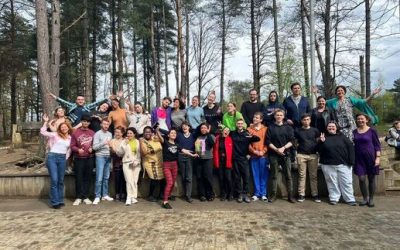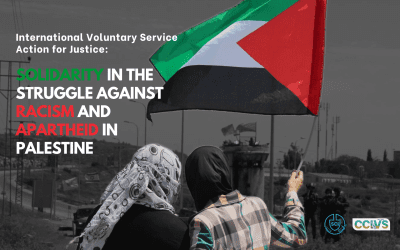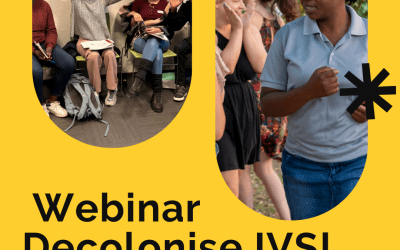The power behind good intentions
A training course by SCI Austria
In December, 1 to 7 December 2022, SCI Austria organised a training about colonialism and volunteering. Aiming to learn and think about colonialism, its definition and its structures, and to help organisations better prepare volunteers that go to the Global South. To decolonize ourselves in other words. Participants from different organisations or branches of SCI benefitted from this training. Now they have returned to their organisations and activities with new tools to struggle with eurocentrism, racism and colonialism within NGOs.
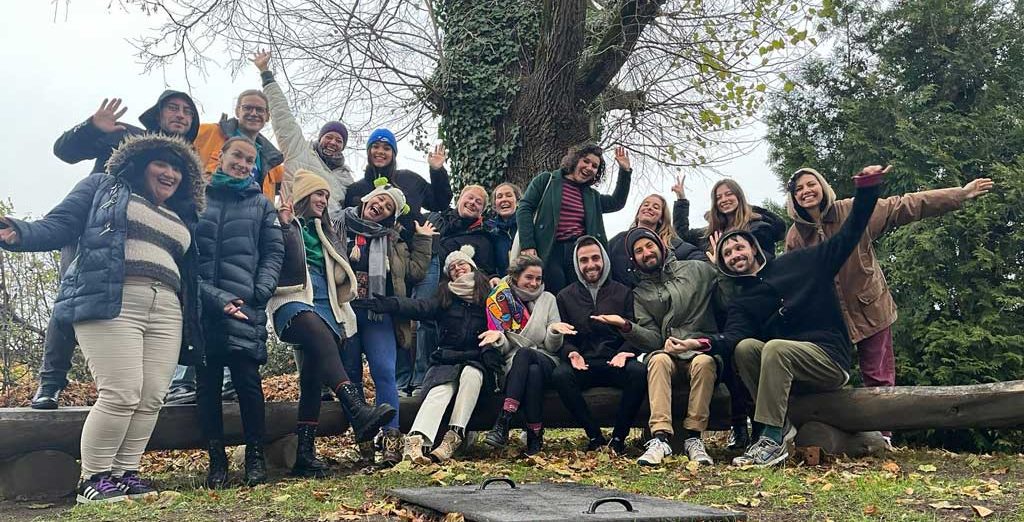
Colonialism, racism and Neocolonialism
The training has begun with a silent exhibition, full of articles, videos, questions and information about colonies of the past and of the present. Indeed, being aware of colonial history is essential to understand its violence, its human and development costs. How to change colonialism dynamics within the global injustice frame was discussed. The world right now is divided in an unbalanced structure that benefits the western society. There can be an irony of wanting to “save” the South without knowing that you are benefitting of this system in many ways. In addition, political action to change the structure from where you already are might be sometimes more useful if the aim is to “help” the South. The common representation of a North helping the South should be changed into the representation of a North still exploiting the South, and benefitting from the history and the colonial debt. Learning about northern countries that are not famous as ex-empires but still benefitted from it is very enlightening, as well as discovering how a lot of every day products belong to colonialism.
Coming from an ex-colonised country, for me colonialism and neocolonialism are everyday matters that we always try to cope with and avoid the harsh challenges caused by them. I have had several experiences with volunteering in the Global North and to be honest, not all organisations even think of this topic and bring it to discuss. Personally I didn’t have problems with individuals but rather with institutions in the global north starting from the visa struggle to the bureaucratic integration that always takes longer time just because we come from the global south and there are always suspicions concerning our purpose of staying there.
– Wided, participant and member of AVEC Tunisian branch
Otherwise, the racism definition was reflected on. Racism, not only as open hatred towards BICOPs* but also as unconscious and internalised racism that includes everyone of us even though we have the best intentions in the world. White privilege needs to be identified as such and how it benefits volunteers as well. Even more because when you learn about colonial history you realise that it was justified as a “civilising mission” as if it was done to save the colonised. Those representations have influenced our minds until now and can also create a defiance towards new self-proclaimed “saviours”.
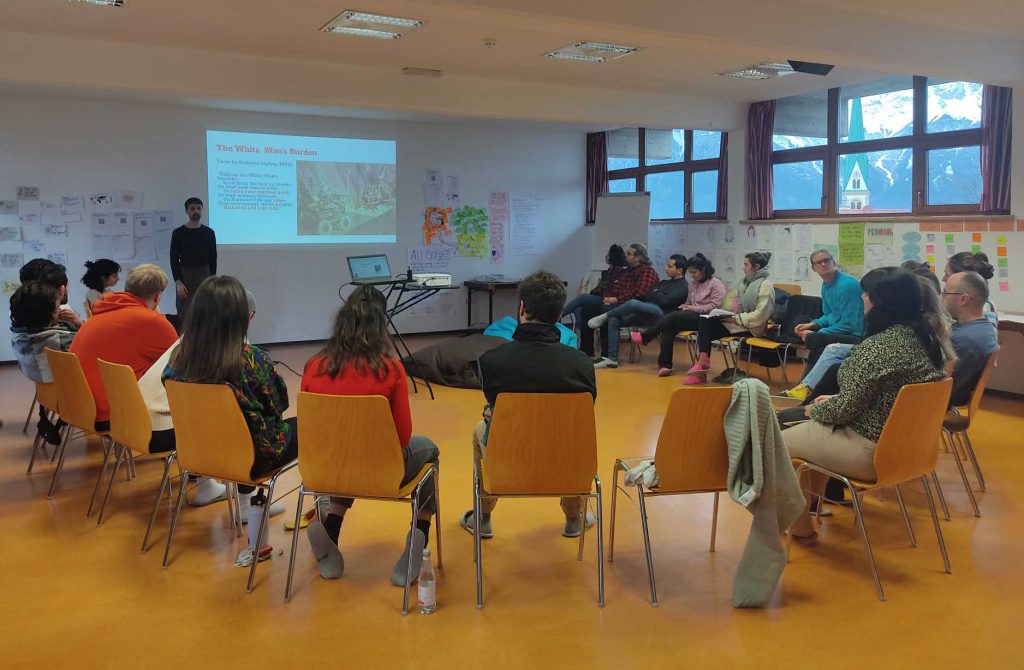
«The white man burden» Kipling poem that illustrates the white’s entitlement and self-proclaimed «civilising mission»
Good intentions are not enough !
Indeed, thinking that the South should be saved is very common in South’s volunteering candidate’s speeches. A lot of them arrive with exotics images, hungry children and changes to bring without realising they might have neocolonialist attitudes.
Ten years ago I realised that all the times we sent volunteers in the Global South there were a lot of problems from them, and they faced big differences compared to their expectations. Then we realised that we might be the problem. This is still a sensitive issue in SCI, a bit like “the elephant in the room
– Thomas, facilitator of the training
Once everyone has historical context in mind, the focus was put on how volunteering and colonialism can meet each other. How we, as organisations, as volunteers, as individuals, we can reproduce those dynamics without knowing it. How voluntourism is growing on good “white saviours” intentions to make profit, most of the time to the detriment of places where they organised projects ? How stereotypical representations make damages and don’t respect human dignity? There is a binary view of the world devalorising Global South often viewed as inferior or underdeveloped even though this only word embraces plural realities. The poverty, the exotic foreign has became a way to promote one’s empathy towards the world. Children are not marketing product to make one seem like a good guy. Sometimes if there is no skill, no knowledge and no precise project you cannot think that you can make great change better than the locals just because you are coming from the North. Volunteering is about supporting local action and working with people and not for people. It’s far from a unilateral help. Very often, hosts teach more to the volunteers than the volunteers bring. Then, volunteers are also the one benefitting from this experience for their future life.
A lot of the time I realised we are not educating them, they are educating us
– Isabel about her voluntourism experience in Malawi
There is this entitlement to think that every person of the North can help in every situation. I always heard phrases like “you can help children in Africa” “you can make a great change”, we are educated to think that way.
– Alanna, a participant
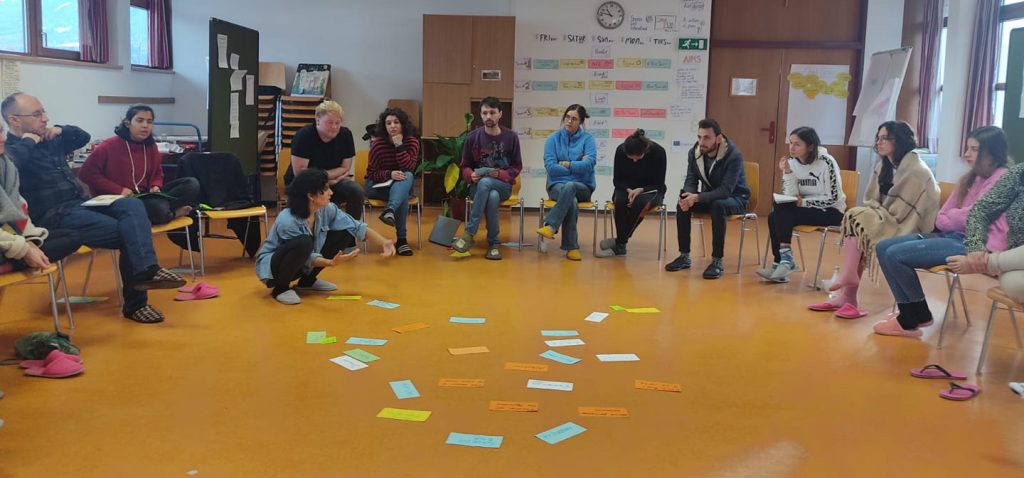
Workshop submitted by participants to prepare volunteers to go to Global South
How to decolonize ourselves?
So what to do? Stop sending volunteers in the Global South? Cancel partnerships? It’s not always easy to reply, even more because there are a lot of perspectives on this. What can be done on a short timeline is to prepare and select volunteers that we send better, on a long timeline we can think about the pertinence of our project and to act more from where we already are. The two aspects were approached in the training. Conveying knowledge about colonialism to make volunteers understand global structures is very important. Then, there are diverse non formal education tools to reflect about problematic behaviours and representations such as eurocentrism, privilege, global action, white saviorism, critical whiteness, asking yourself why you wanna go to the Global South. As organisations we can also try to identify problems linked to racism and colonialism and to increase diversity or make South-North exchanges easier. A part of the training was dedicated to planning the aftermath of it, to encourage us to think about concrete actions to do within our organisations right after we return to them. Analysing the harsh reality theoretically is very enlightening but finding short terms and long terms goals to reach and build a better future, enables us not to fall into pessimism and inaction.
The methods of examining this topic are really a discovery for me: Silent Exhibition, Theatre of the oppressed, Map Game are really interesting. I want to reproduce them in my organisation.
– Wided, participant and member of AVEC Tunisian branch
At the end, volunteers exchanges between North and South can be beautiful experiences that help maintain the link between partners and creating a web of international cooperation. The human component of it should not be forget as it can never be reached online. The more we are and the closer we are, the more power we have. There are also cases where international presence can be useful, for diplomatic reasons or diffusing informations more safely for example. Palestine’s projects can rely on foreign presence for example since Israel’s military try to be more careful around internationals to try to maintain a good public image. Being present can also be used as a pacific tool against violence.
We think that it is important to continue exchanging volunteers, not only sending but also hosting in order to have reciprocity and make the exchanges in both ways possible. It is important because European volunteers can also help to destroy the bad images and stereotypes, they can support and work together with the local communities, they can learn from them. Of course, if they have proper preparation, they can actually promote equality and anti-racist anti-colonial behaviour.
– Iryna Tomenko, International Exchanges Coordinator of Solidarités et Jeunesses, participant
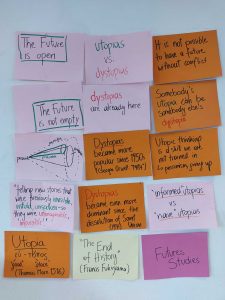
Utopia’s importance to build a future
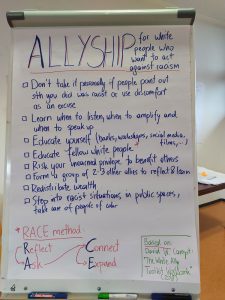
How to be a good ally: recognising and fighting your own racism
We encourage you to read the toolkit “The power behind good intentions” for a deep understanding of the topic. The toolkit should be updated soon.
Please, inform and share on this topic, yourself or the others. There are training sessions of SCI about it and this February a campaign to decolonize ourselves is coming!
*Black Indigenous and People of Colour
Explore more news
Call for applications: ‘Diverse Voices, Common Needs: Building Peaceful Communities Together
Training Course “Diverse Voices, Common Needs: Building Peaceful Communities Together” for youth workers, peace activists, leaders, volunteers 📍 Antwerp, Belgium, 📅 12-19 November 2024 CALL FOR PARTICIPANTS ✔ Are you a resident of Albania, Belgium, Bulgaria, Germany, Hungary, Ireland, Kosovo, North Macedonia, Poland, Serbia or Spain? ✔ Are you interested in the topics of peace, diversity and...
Palestine Online Conference: Solidarity in the Struggle Against Racism
On the 17th of July, CCIVS and SCI organised a conference about Palestine. We had the chance to hear personal stories, learn more about Palestine and what we can do to foster solidarity and end racism, apartheid and the genocide in Palestine. The speakers were: Ratherford Mwaruta, CCIVS President and activist. Dr Husam S. Zomlot, Ambassador of Palestine to the United Kingdom and academic engaged...
What’s up in the Decolonise IVS project?
The project Decolonise International Voluntary Service has been running for 2 years. Join the webinar on July 9th at 2 PM CEST to learn more about the project and its outcomes.

